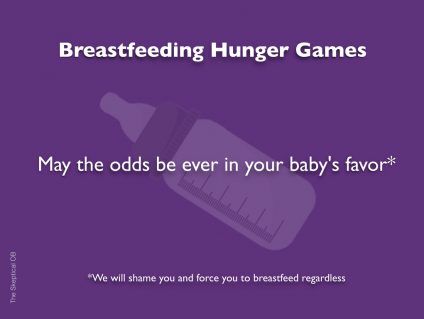
I read and loved The Hunger Games series of books. For those who haven’t read them or seen the movies, The Hunger Games describes a dystopian society forced each year to send some of their youngest members to the “games” that are a literally fight to the death. The leaders of the dystopian society view the games as a tool to bind society together through fear, desperation and spectacle.
I was reminded of that when I read the JAMA piece, The Hunger Games, written by pediatrician Rebecca E. MacDonell-Yilmaz, MD, MPH. Her pain is palpable:
[pullquote align=”right” cite=”” link=”” color=”” class=”” size=””]Promoting exclusive breastfeeding and hoping that the odds of timely access to sufficient milk are in the baby’s favor is immoral.[/pullquote]
I cried the first time I fed formula to my infant son.
Many of my friends and colleagues did as well. One banished visiting family members—including her husband—from the hospital room, apologizing to her days-old little boy as she brought a bottle of premixed formula to his lips. Another had trouble latching her child but pumped doggedly for the year following his birth. When feeding him bottles of expressed milk in public, she found herself explaining to strangers—strangers who had neither asked nor even looked at her askance—that it was, in fact, breast milk, not formula. Heaven forbid they think she was giving her child anything less than the best.
She had assumed that she would never let a drop of formula pass his lips:
As a physician and as a member of a family that has largely breastfed its infants, I had no doubts that I would breastfeed any and all babies that I bore. During my residency in pediatrics, I viewed formula as an expensive and unnecessary crutch that hinted at a mother’s lack of dedication to her child. Mothers whose milk “hadn’t come in,” who struggled to achieve a latch, who began by giving small feedings of formula then tumbled face-first down the slippery slope into exclusive formula use were simply uninformed, disengaged, or even lazy.
But she realized that her son was becoming dehydrated since her milk had not yet come in:
We started with syringe feedings, unsure of how much to offer and how he would react. He slurped it voraciously, halting his crying to root in the air for more, drawing out my tears faster and faster as my guilt at giving formula titrated to guilt at having starved my son.
Formula supplementation is anathema to lactivists, both lay and professional; they insist that it interferes with breastfeeding. Yet the research shows the opposite: early judicious formula supplementation improves the chances for an extended breastfeeding relationship. Indeed, the author went on to breastfeed he son for more than a year.
Dr. MacDonell-Yilmaz, like many new mothers, had been forced to play the Breastfeeding Hunger Games for the benefits of “society.” Lactation professionals have decreed that relentless promotion of breastfeeding is the order of the day and it doesn’t matter how many babies and mothers are hurt in the process.
Those who stand by as babies suffer hunger, dehydration, starvation and occasionally death reassure themeselves that they are promoting public health though the health of individual babies may suffer in the process. The dystopian leaders in The Hunger Games also insisted that they were promoting the public good even as individuals suffered and died. But the promotion of the “public good” NEVER justifies letting individuals suffer when that suffering can easily be prevented.
The focus of hospitals on attaining Baby-Friendly status begins with laudable efforts to support mothers and babies as they learn this skill … But the moratorium on feeding babies formula “unless medically indicated” diverges into territory that I fear trades support and encouragement for guilt and shame…
Because lactation professionals have utterly lost sight of the fundamental truth of healthcare practice: a good outcome (healthy baby, healthy mother) is ALWAYS more important than the value of any biological process, no matter how much it is idealized and idolized. Fed is ALWAYS best! Starving a baby is NEVER justified. Promoting exclusive breastfeeding and hoping that the odds of timely access to sufficient milk are in the baby’s favor is immoral and inexcusable!
And it’s not just the wellbeing of the baby that counts. The mother counts, too.
Ultimately, maintaining the mental health of the mother such that she is able not only to feed but to bond with and nurture her infant should trump any debate over which combination of nutrients she provides.
There is no benefit of breastfeeding worth letting a baby starve, even temporarily. There is no benefit of breastfeeding worth letting a baby’s brain bathe in the neurotoxins of high salt (dehydration) or high bilirubin (jaundice). There is no benefit of breastfeeding worth depriving a baby’s brain of the fuel to continue working properly (hypoglycemia). There is no benefit to breastfeeding worth risking maternal self-loathing, let alone risking or exacerbating pospartum depression.
In other words, there is no benefit to society that justifies forcing babies and mothers into the Breastfeeding Hunger Games.
We must end the relentless promotion of exclusive breastfeeding. Our motto should be: her baby, her body, her breasts, her choice.
We must end the Baby Friendly Hospital Initiative immediately. It moralistic, unscientific and harmful.
And we must acknowledge the incontrovertible truth: Fed Is Best!

